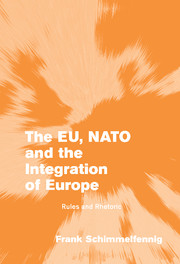Book contents
- Frontmatter
- Contents
- List of figures
- List of tables
- Acknowledgments
- List of abbreviations
- Introduction
- PART I Security, power or welfare? Eastern enlargement in a rationalist perspective
- PART II Expanding the Western community of liberal values and norms: Eastern enlargement in a sociological perspective
- PART III Association instead of membership: preferences and bargaining power in Eastern enlargement
- PART IV From association to membership: rhetorical action in Eastern enlargement
- Strategic action in international community: concluding remarks
- Appendix (Interviews)
- List of references
- Index
PART III - Association instead of membership: preferences and bargaining power in Eastern enlargement
Published online by Cambridge University Press: 22 September 2009
- Frontmatter
- Contents
- List of figures
- List of tables
- Acknowledgments
- List of abbreviations
- Introduction
- PART I Security, power or welfare? Eastern enlargement in a rationalist perspective
- PART II Expanding the Western community of liberal values and norms: Eastern enlargement in a sociological perspective
- PART III Association instead of membership: preferences and bargaining power in Eastern enlargement
- PART IV From association to membership: rhetorical action in Eastern enlargement
- Strategic action in international community: concluding remarks
- Appendix (Interviews)
- List of references
- Index
Summary
This part opens the second half of the book. In the first half, I analyzed and explained the outcomes of NATO and EU Eastern enlargement. In this and the following part, the focus will be on the enlargement process that brought about these outcomes. It is the central finding of the outcome analysis that Eastern enlargement is robustly correlated with the spread and consolidation of liberal democracy in the CEECs and that, therefore, it appears to be driven by the liberal values, norms, and collective identity of the Western international community. Here, the main research question will be: how did the community rules affect and produce the Eastern enlargement outcome?
As in the preceding chapters, the analysis will be theoretically informed by rationalist and sociological institutionalism. The theoretical assumptions of both schools lead not only to conditions of enlargement as such but also to hypotheses about the preferences of the actors, their political behavior, and the political process in which individual preferences and actions are transformed into collective outcomes. In chapter 7, I develop four process hypotheses based on different modes of action: habitual, normative, communicative, and rhetorical action. Since sociological institutionalism has so far provided the most convincing explanation of Eastern enlargement, I begin with the standard sociological hypotheses of habitual and normative action.
In chapter 8, I analyze state preferences and the initial decision-making process on Eastern enlargement and examine whether they conform to sociological institutionalist expectations. I will argue that this is not the case.
- Type
- Chapter
- Information
- The EU, NATO and the Integration of EuropeRules and Rhetoric, pp. 155 - 156Publisher: Cambridge University PressPrint publication year: 2003



